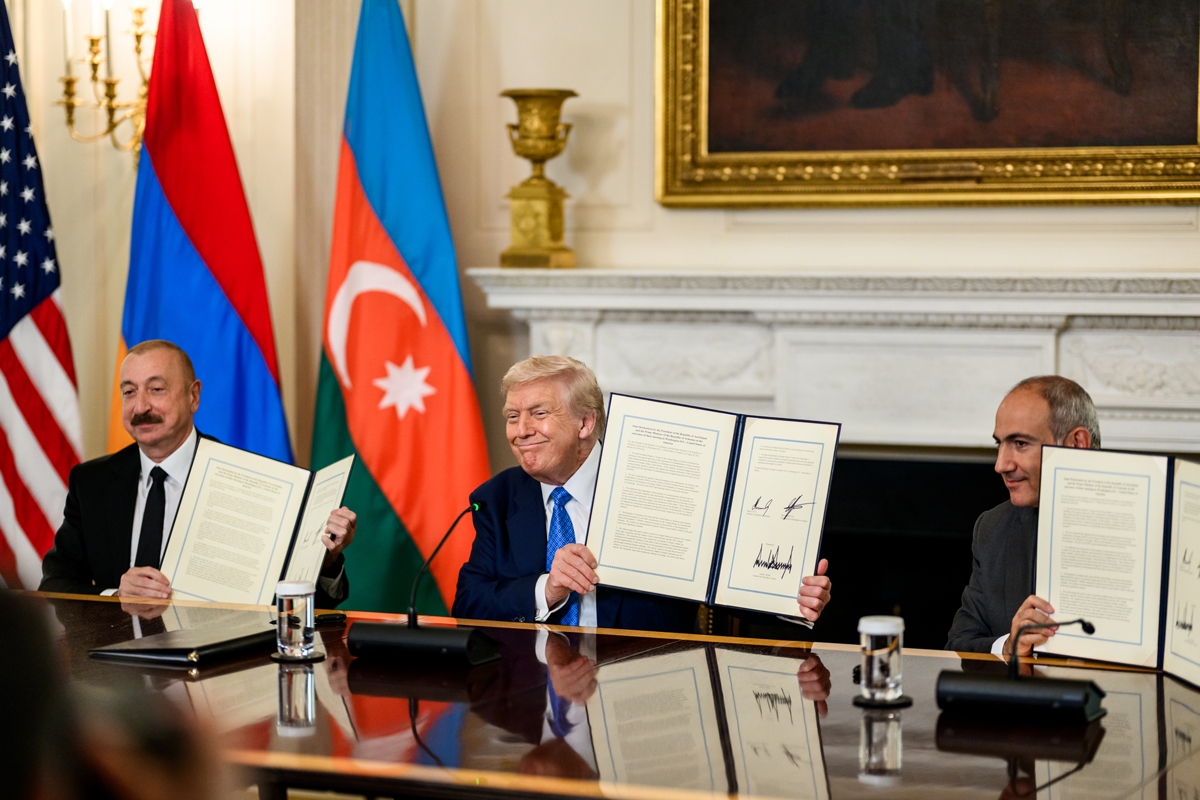The opening of a new geopolitical chapter and the perspective from Chian, Iran, Türkiye.
The opening of a new geopolitical chapter and the perspective from Chian, Iran, Türkiye.
By Yıldıran Acar
On Friday, August 8, 2025, Azerbaijani President Ilham Aliyev and Armenian Prime Minister Nikol Pashinyan signed a historic agreement at the White House, at the invitation of U.S. President Donald Trump. According to the agreement, the Zangezur Corridor will be leased to the United States for a period of 99 years and will be named “Trump Route for International Peace and Prosperity” (TRIPP). On the surface, this may seem like a peace agreement between the two nations, but in reality, it is part of a broader and more complex geopolitical maneuver that signals a significant shift in global power dynamics.
The conflict in Ukraine was initially aimed at weakening Russia through hybrid warfare—employing economic, diplomatic, and military tactics. However, after more than 3.5 years of fighting, Russia has demonstrated resilience, and the West has failed to achieve the desired results. Russia has gained ground on the battlefield and continued its advances. At the same time, internal fractures have become evident within the Collective West, with various disagreements surfacing. This situation has prompted the Collective West to seek new strategic regions, with the South Caucasus emerging as a key area of focus. One of the main objectives behind this shift is to create a second front alongside the Ukrainian conflict in an effort to weaken Russia through hybrid warfare tactics. The developments in Ukraine have reverberated throughout the region, including influencing the situation in Syria, where attempts to alter the political landscape have similarly been affected.
The leasing of the Zangezur Corridor to the United States for 99 years is not merely a loss of influence for Russia. It also represents a broader attempt to restrict Russia’s southern alliances and encircle it from the south through U.S. and NATO influence. This move marks a significant geopolitical shift that will have far-reaching consequences, not only for Russia but for other key regional actors as well.
China’s Perspective: Transportation and Energy Security
The developments in the South Caucasus are being closely monitored by China, as the Zangezur Corridor represents a crucial link in the overland transportation routes between Central Asia and Europe. Under its Belt and Road Initiative (BRI), China has long viewed the region’s logistical and energy networks as vital to its economic expansion. Should the United States gain control of the Zangezur Corridor, it would pose a direct challenge to China’s objective of ensuring uninterrupted connectivity between Central Asia and Europe.
The transportation and energy networks passing through the Caspian Sea to Iran and Central Asia are particularly significant for China’s long-term economic growth. These routes are of strategic importance to China, and any shift in the Zangezur Corridor’s control would severely limit China’s influence in the region. In response, China may take countermeasures through increased economic investments and diplomatic engagement, aiming to mitigate the impact of a stronger Western presence and maintain its own strategic positioning.
Israel’s Strategic Position: Security and Regional Influence
The South Caucasus region holds immense strategic value for Israel, particularly in terms of energy security, intelligence cooperation, and the broader framework of regional partnerships. The opening of the Zangezur Corridor represents a significant opportunity for Israel to strengthen its ties with Azerbaijan, thereby increasing its influence in this key geopolitical space. Israel’s relationship with Azerbaijan is crucial, especially considering the shared concerns regarding Iran’s geopolitical ambitions. Given Israel’s heightened concerns over Iran’s nuclear program, Azerbaijan is viewed as an important strategic partner, acting as a buffer zone in Israel’s broader regional security strategy.
The Zangezur Corridor’s potential to strengthen Israeli-Azerbaijani relations would further enhance Israel’s role in the region, enabling it to extend its strategic influence in the South Caucasus. This development would bolster Israel’s ability to balance regional threats, particularly those posed by Iran, and expand its network of strategic alliances in the area.
Iran’s Perspective: Security and Strategic Depth
From Iran’s standpoint, the Zangezur Corridor is not only a geographical concern but also a significant strategic setback. The establishment of a permanent U.S. presence in the region would disrupt the security balance along Iran’s northern borders and limit its access to critical energy routes. The transportation and energy corridors that pass through the Caspian Sea to Iran and Central Asia are vital for Iran’s economic and geopolitical interests. The shift of the Zangezur Corridor under U.S. control threatens to sever Iran’s connectivity with Central Asia, which would diminish its strategic depth in the region.
For Iran, the growing U.S. presence in the South Caucasus is perceived as a direct security threat. Given Iran’s nuclear program and its broader regional ambitions, this development could open a second front for Iran. In response, Iran may seek to reinforce its strategic alliance with Russia, bolstering military cooperation and enhancing diplomatic efforts to counterbalance U.S. influence and safeguard its interests in the region.
Türkiye’s Strategic Role: Opportunities and Risks
The opening of the Zangezur Corridor presents Türkiye with both significant opportunities and considerable risks. Direct overland connectivity with Azerbaijan would enhance Türkiye’s energy security, strengthen its ties with the Turkic-World, and create new avenues for regional integration. However, the U.S. presence in the region complicates Türkiye’s delicate balancing act between its Western and Russian interests.
The potential U.S. control over the Zangezur Corridor may require Türkiye to reassess its regional strategies, particularly its collaboration with Russia. Türkiye’s pursuit of a balanced foreign policy in the region—navigating its relationships with both Russia and the West—could become even more complex in the face of this development. Furthermore, the establishment of U.S. military presence in the region means that Türkiye could face encirclement from both the south and east, heightening strategic risks. This situation may compel Türkiye to rethink its security priorities and regional alliances in the years ahead.
Conclusion: A New Geopolitical Chapter
While the Zangezur Corridor agreement may appear to be a peace settlement between Azerbaijan and Armenia, it is, in reality, a much broader strategic maneuver with profound implications for global geopolitics. The Collective West, unable to achieve its objectives in Ukraine, is now seeking to open a new front in the South Caucasus, aiming to recalibrate the regional power dynamics. This shift will have significant consequences for several key global and regional actors, including Iran, China, Israel, and Türkiye, all of whom will be directly affected by the changes unfolding in the region.
For Iran, the increase in U.S. presence signals a loss of strategic depth; for China, it poses risks to energy security and trade routes; for Israel, it offers an opportunity to further consolidate its influence in Azerbaijan. Meanwhile, Türkiye must carefully navigate these shifting dynamics, balancing its strategic interests with those of both the West and Russia.
The opening of the Zangezur Corridor marks the beginning of a new chapter in global geopolitics. In the coming years, the South Caucasus may emerge as one of the most pivotal arenas in the competition for global power. The long-term ramifications of these developments will unfold over time, gradually revealing their full impact on global political balances.
The presence of the United States in the region directly contradicts the strategic interests of regional powers such as Iran, Russia, and China. This situation also presents significant risks for Türkiye. Therefore, if these countries cooperate and act in unison, it is likely that the project will remain nothing more than a paper plan, unable to progress beyond theoretical stages.

















Leave a Reply